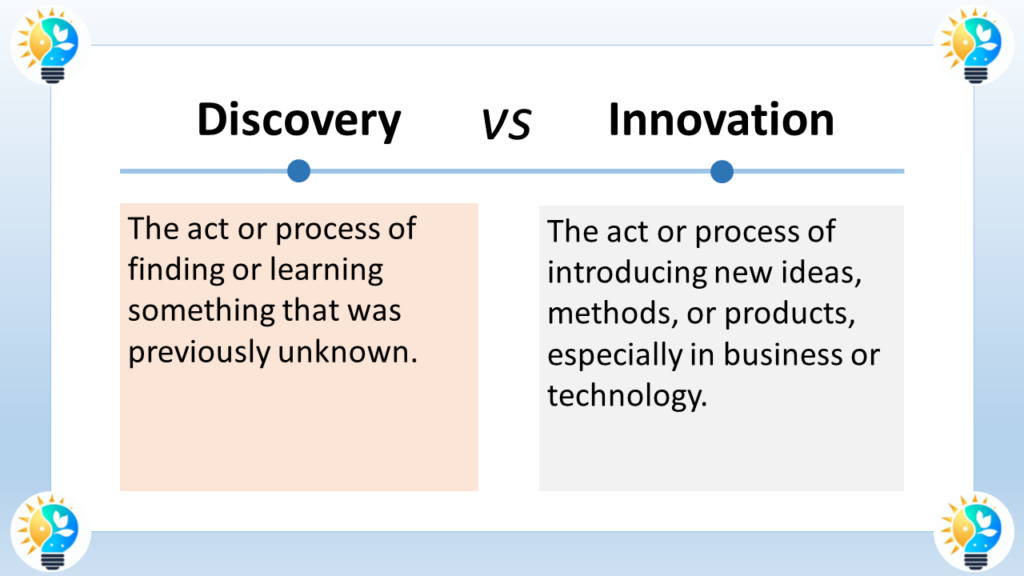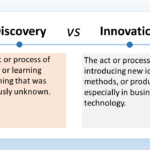The difference between discovery and innovation lies in their respective contributions to knowledge and application.
Discovery involves uncovering something that already exists but was previously unknown.
Innovation is about creating new solutions or methods that did not exist before.

Definition
Discovery
Discovery is the act of finding something that was not known before, often revealing new knowledge about the natural world or previously unrecognized phenomena.
- Characteristics of Discovery:
- Revelation: It brings to light existence or facts that were hidden or unknown.
- Exploration: Often associated with scientific research or geographical expeditions.
- Knowledge Expansion: Contributes to the existing body of knowledge without necessarily leading to immediate practical applications.
Innovation
Innovation entails the development and application of ideas, products, or processes that are novel and able to significantly alter existing conditions or practices.
- Characteristics of Innovation:
- Creation: Involves designing and executing new concepts.
- Application: Not just about new ideas but also about their successful implementation.
- Market Impact: Frequently reshapes industries and consumer behavior through its applications.
More Synonyms on innovation, innovate and innovative
Innovation Terms

Innovation is considered as a driving force in progress.
It includes the introduction of novel ideas, methods, or products that bring positive change and advancement.
For more information about innovations, check our glossary
Relationship and Relevance
Discovery can be a precursor to innovation when the newfound knowledge leads to the development of new technologies or solutions. However, innovation can occur independently of new discoveries by combining existing concepts or technologies in novel ways.
Discovery
- Discovery refers to the recognition or identification of something that already exists, but has not been found or known before.
- Discoveries are usually natural occurrences or phenomena that are uncovered through exploration and investigation.
- Discoveries happen by accident or chance, though they can also result from purposeful research and inquiry.
- Discoveries cannot be patented, as they involve finding something that already naturally exists.
Innovation
- Innovation refers to the creation of something entirely new - a novel product, service, process or business model that did not exist before.
- Innovations are the result of deliberate human action, creativity and experimentation. They involve developing new solutions through inventive thinking.
- Innovations can be protected through patents, as they involve the invention of something unique and non-obvious.
- Innovations often build on discoveries, using new scientific or technological knowledge to develop novel applications and solutions.
In summary, discoveries involve finding something that already exists in nature, while innovations involve inventing or creating something new that has never existed before. Discoveries lay the groundwork for future innovations, but the two processes are distinct. Innovations require a more proactive, creative approach compared to the more reactive, exploratory nature of discoveries.
Context for Using Each Term
- Discovery is suitable when referring to the process of finding new knowledge, such as a scientific breakthrough or the unearthing of an archaeological artifact.
- Innovation is appropriate when discussing the practical application of ideas to create new products, services, or methodologies.
Example of Utilization
The identification of a new element on the periodic table is a discovery. If a chemist uses this element to create a new compound that leads to the development of advanced materials for industry, that is innovation.
In summary, discovery is about uncovering new knowledge or phenomena, while innovation is concerned with the application of ideas or creations that result in new or improved products, services, or ways of doing things. Both are vital for progress but play distinct roles in the advancement of science, technology, and society.
- Difference Between Invention and Discovery
- Difference Between Discovery and Invention
- Difference Between Invention and Discovery
- Innovations: Invented or Discovered?
- Discovery, Invention, and Innovation
FAQ
Q1: Can a discovery lead directly to innovation?
A1: Yes, discoveries often provide the knowledge or inspiration that leads to innovative applications or solutions.
Q2: Is innovation always based on new discoveries?
A2: Not necessarily. Many innovations combine existing knowledge or technologies in new ways without requiring new discoveries.
Q3: How do research institutions balance discovery and innovation?
A3: Many institutions focus on both, conducting fundamental research for discoveries while also pursuing applied research and development for innovations.
Q4: Can innovation occur without discovery?
A4: Yes, innovation can involve applying existing knowledge in new ways or combining known elements to create novel solutions.
Q5: Are certain fields more focused on discovery or innovation?
A5: While both are important across sectors, fields like fundamental science often emphasize discovery, while engineering and business tend to focus more on innovation.

